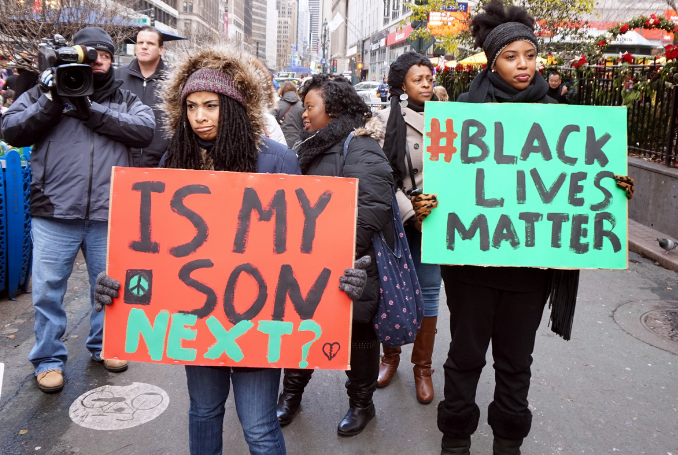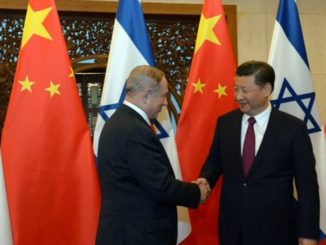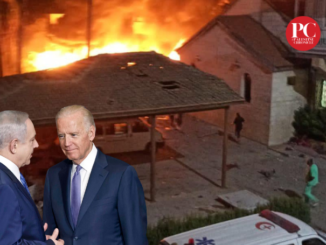
By Benay Blend
In “Black-Outs, Black Lives Matter, and Black Power,” Erica Caines explains how “symbolic gestures of solidarity” have co-opted the power of the movement into “feel-good moments” for those who participate and shaming of those who don’t. If solidarity with Palestine has played a role in shaping Black movements in America, as Angela Davis suggests, then activists in that arena should be equally cautious of “displays” of unity and activism that work solely to incorporate resistance into a show of empty words.
According to Caines, the origins of the “Black-out day,” black squares replacing profile pictures on social media, go back to 2015 when two Black women organized a day devoted to images of Black people. Similar to #TweetYourThobe, a movement started by writer Susan Muaddi Darraj to honor Congresswoman Rashida Tlaib along with all Palestinian women who tweeted pictures of their embroidered clothing, this earlier action highlighted the daily lives of Black people from all walks of life.
Five years later, #BlackOutDay in its current form proves meaningless in many ways. As Cain explains, because it drew attention away from “countrywide rebellion” by presenting “a co-opted” image “as activism,” thereby disrupting “all of the necessary online organizing information” under the Black Lives Matter (BLM) hashtag, a collection that organizers have long been “curating for accessibility.”
In the United States, crowds are continuing to protest police killings that go on and on. Regarding Palestine, impending annexation is being met with calls for a Day of Rage on July 1. Sponsored by Al-Awda, the Palestine Right of Return Coalition, the group is asking for world-wide actions to oppose U.S.-Israeli efforts to “liquidate the Palestinian cause” and its people.
Like Black-out day, messages that incorporate neoliberal capitalism, Palestinian liberation and BLM are drawing attention away from what is really happening in the street. For example, Ben and Jerry’s launching of the new flavor “pecan resist,” a combination of chocolate ice cream with white and dark fudge chunks, pecans, walnuts and fudge-covered almonds, sounds particularly enticing to those of us in months-long quarantine with little to look forward to at the end of the day besides Netflix and perhaps some sugar-laden treats.
Beyond that value, though, its doubtful that Ben and Jerry’s can deliver what it promises: “Alongside all those nutty chunks,” your purchase can “peacefully resist the Trump Administration” as well as “build a future” that values all the people. While articles of substance made the rounds of social media, Ben and Jerry’s ad fill space, too, as if merely buying a certain brand of ice cream amounts to useful activism.
As Onyesonwu Chatoyer, an organizer with the All African People’s Revolutionary Party-Albuquerque, observes: “I’ve seen folks argue that this broad support from corporate and political entities is a sign of progress. I actually think it’s a sign that the ruling class has united on a strategy for how to control and then demobilize and disarm the movement.”
Moreover, despite the social justice mission associated with Ben And Jerry’s, Vermonters for Justice in Palestine have led a boycott of the product for several years, notably because, they say, “peace, love, and occupation” are a bad mix. Despite their socially conscious brand, the company’s Israeli franchise has sold ice cream in “illegal, Jewish-only settlements in the occupied West Bank and East Jerusalem, transported on Jewish-only roads, on trucks with Jewish-only license plates, passing easily through military checkpoints that bedevil others.”
Despite demands to do so, Ben and Jerry’s has refused to end this practice, thus “condemn[ing] racism in America,” but “condon[ing] it in Palestine,” much like liberal Zionists do, too. Not only has the firm drawn attention away from rebellion in the streets, it pretty much highlights what Henry A. Giroux claims in a recent article: “In this historical moment, the pandemic of racist violence cannot be separated from the violence imposed by neoliberal capitalism.” The revolution will not be won by choosing to buy the (in)correct brand of ice cream.
Neither will it be won by focusing on the machinations of electoral politics that drain energy from the every-day work of organizing. For example, presumptive Democratic presidential nominee Joe Biden recently announced that he opposes Israel moving forward to annex the West Bank and Jordan Valley. His motives are important. “Israel needs to stop the threats of annexation and stop settlement activity because it will choke off any hope of peace,” he said.
‘I Can’t Breathe’: How Israel’s War Technology Contributes to the Subjugation of the American People
From the ‘Palestinian Chair’, and other forms of torture methods used by the US army to the militarization of the American police and the massive ‘security apparatus’ used to spy on and monitor ordinary Americans, Israel’s war technology is now part and parcel of the everyday American life.In this episode of Palestine Chronicle TV, editors Ramzy Baroud and Romana Rubeo discuss the Israeli involvement in shaping state-sponsored violence, which is currently at full display in American streets. From crowd control tactics to the knee-on-neck hold, which killed African American man George Floyd on May 25, PC editors will provide a range of evidence that implicates Israel in the routine violence meted out against US citizens.Join us Wednesday, June 10 @ 12 pm PST (10 pm Palestine time) and be part of the discussion.
Posted by The Palestine Chronicle on Wednesday, June 10, 2020
By that, he means that extending sovereignty over the region will destroy the possibility of a two-state solution, a vision that Israel never seriously considered in the first place. He also demands that the Palestinian leadership “end incitement against Israelis and…stop rocket attacks coming from the Gaza Strip,” a statement that fails to mention the people’s right to resist their Occupation as well as the context of who is inciting who in these exchanges.
Finally, Biden insists that Palestinians “need to acknowledge Israel’s right to exist,” thereby affirming unqualified support for the Zionist state, while implying at the same time that Palestinians have no right to exist at all.
“The practice of eliminating people is baked into the country’s founding,” writes Cherokee historian Roxanne Dunbar-Ortiz, “so of course it worms its way into everyone’s mind that it is OK to just eliminate a whole group of people,” be it people of color, the poor, the elderly, or in this case, Biden’s dismissal of Palestinians. In modern-day America, neoliberal capitalism has co-opted resistance movements over and over again with the language of individualism and consumption. If we only buy the right kind of ice cream, support the right Green business (and make sure that business is local), then our problems will be solved.
Much like Trump’s Peace to Prosperity deal (that was firmly rejected by Palestinians), corporate America’s sudden awareness of racial inequity are part of a move to “domesticate the resistance,” writes Caines, and must be recognized as such. By pledging support for Black communities, these efforts are composed of “symbolic measures, opportunist entertainers and political figures, and NO power.”
“So BLMish things, protests, etc., is now a billion dollar business?” asks Mawusi Ture, an activist with Black Alliance 4 Peace and the Philly Tenants Union. “Is that money being used to bail out protesters, pay their rent while they in jail, pay legal fees, take care of their children, etc.? Who collects this money, who decides where it goes?”
If peace, love and capitalism are not compatible, neither are revolution, power, and donations from the corporate community.
– Benay Blend received her doctorate in American Studies from the University of New Mexico. Her scholarly works include Douglas Vakoch and Sam Mickey, Eds. (2017), “’Neither Homeland Nor Exile are Words’: ‘Situated Knowledge’ in the Works of Palestinian and Native American Writers”. She contributed this article to The Palestine Chronicle.

– Benay Blend earned her doctorate in American Studies from the University of New Mexico. Her scholarly works include Douglas Vakoch and Sam Mickey, Eds. (2017), “’Neither Homeland Nor Exile are Words’: ‘Situated Knowledge’ in the Works of Palestinian and Native American Writers”. She contributed this article to The Palestine Chronicle.








